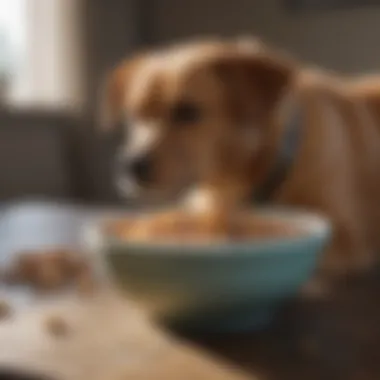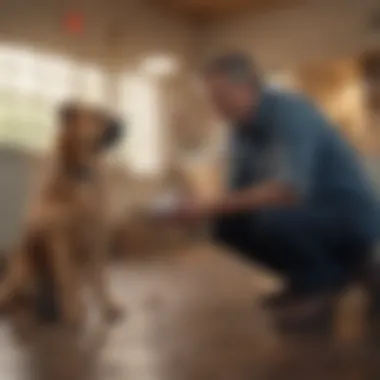Effective Remedies for Dog Diarrhea Management


Intro
Diarrhea in dogs is a common occurrence that can be distressing for both pets and their owners. Understanding the reasons behind this issue is essential for effective management. There are various remedies and dietary changes that can help alleviate the symptoms of diarrhea. By recognizing the underlying causes, dog owners can take informed steps toward providing relief to their furry companions. This guide aims to empower pet owners with knowledge and practical solutions.
Understanding Diarrhea in Dogs
Diarrhea can arise from multiple factors, including dietary indiscretion, infections, or underlying health conditions. Dogs often exhibit signs like increased frequency of bowel movements or a change in the stool's consistency. Identifying the cause is vital in determining the right approach to treatment.
Common Causes of Diarrhea
Several common causes can lead to diarrhea in dogs:
- Dietary changes: Sudden shifts in diet can upset a dog's digestive system.
- Infections: Viral, bacterial, or parasitic infections can lead to gastrointestinal distress.
- Food intolerances: Some dogs may react negatively to certain ingredients.
- Stress: Environmental changes can also trigger digestive issues.
Understanding these causes is a crucial first step in managing diarrhea effectively.
"Proper identification of diarrhea cause is key to a successful treatment."
Home Remedies for Dog Diarrhea
When managing diarrhea in dogs, several home remedies can provide assistance. Always consult with a veterinarian if the condition persists.
- Bland diet: A temporary diet of boiled chicken and rice may help firm up stools.
- Pumpkin: Plain canned pumpkin is an excellent source of fiber and can aid in soothing the gut.
- Probiotics: Supplements like FortiFlora can restore healthy gut bacteria.
- Water: Ensure your dog stays hydrated, as diarrhea can lead to dehydration.
These options offer a starting point for non-invasive treatment.
Dietary Adjustments
In addition to home remedies, dietary adjustments can significantly improve your dog's digestive health.
Recommended Foods
- High-quality dog food: Select a dog food with natural ingredients and balanced nutrition.
- Fiber-rich foods: Incorporating fiber may help solidify stool over time.
- Hydration: Regular access to fresh water is crucial during recovery.
Making these adjustments can play a significant role in managing diarrhea.
Vet Consultation
Recognizing when to seek professional help can save your dog from further distress.
Signs that Require Vet Attention
- Persistent diarrhea: If diarrhea lasts longer than 24 hours, contact a vet.
- Blood in stool: Any traces of blood should prompt immediate veterinary assessment.
- Vomiting: Accompanying vomiting can indicate a more serious issue.
Taking prompt action in these cases can lead to better health outcomes.
End
Managing diarrhea in dogs involves understanding the potential causes and implementing effective treatments. From home remedies to dietary changes, dog owners can take proactive steps to help their pets. However, knowing when to consult a veterinarian is just as important. This comprehensive approach ensures that your dog's health and well-being remain a top priority.
Understanding Diarrhea in Dogs
Understanding diarrhea in dogs is essential for any pet owner. Diarrhea can be a common, yet serious issue that affects a dog's overall health. It can lead to dehydration, which can be life-threatening if left untreated. Recognizing the signs of diarrhea allows for timely interventions and ensuring your dog receives the necessary care. With the right knowledge, dog owners can better manage their pet's gut health and well-being.
Definition and Symptoms
Diarrhea is defined as an increase in the frequency and fluidity of bowel movements. It can manifest in several ways including loose stools, watery feces, or even an urgent need to go outside. Symptoms might vary from one dog to another but common signs include:
- Frequent bowel movements
- Straining or discomfort during defecation
- Blood or mucus in the stool
- Abdominal cramps or bloating
- Lethargy and decreased appetite
It is important to note that diarrhea may resolve on its own but persistent cases should not be ignored.
Common Causes


Identifying the cause of diarrhea is crucial to effective treatment. Here are some common causes:
Dietary indiscretion
Dietary indiscretion refers to a dog's tendency to eat things they should not, such as spoiled food, human food, or foreign objects. This behavior is a common contributor to diarrhea in dogs. The key characteristic here is that it is often a temporary issue, resolving once the irritant is eliminated from the dog's system. The unique feature of dietary indiscretion is its immediate impact on digestion, which can sometimes lead to severe but short-lived gastrointestinal distress.
Infections
Infections caused by bacteria, viruses, or parasites can lead to diarrhea. Common pathogens include Salmonella or parvovirus, which are particularly severe and require swift veterinary care. The key characteristic of infections is their potential to cause widespread symptoms not just in the digestive tract but throughout the body. Infections require a careful approach since neglecting them can lead to serious health complications.
Parasites
Parasites such as Giardia and roundworms can also cause diarrhea in dogs. These organisms inhabit the intestines, leading not only to diarrhea but also to weight loss and lethargy. A significant aspect of parasites is their ability to cause long-term issues if not treated properly. Regular veterinary check-ups can help identify and manage parasite infestations before they lead to diarrhea.
Underlying health conditions
Underlying health conditions, including pancreatitis or inflammatory bowel disease, can be a critical cause of diarrhea in dogs. These conditions often require long-term management and possibly more invasive treatments. The key characteristic of these health issues is their chronic nature, as opposed to the often temporary causes of diarrhea. Understanding these conditions is vital since it can influence the overall health trajectory of the dog.
In summary, identifying the underlying cause of diarrhea is crucial for effective treatment and management. Regular veterinary visits and maintaining a proper diet can help prevent these issues.
Home Remedies for Diarrhea
Home remedies for diarrhea in dogs serve as an essential part of managing gastrointestinal discomfort. They can provide immediate relief and help to stabilize the dog's health without immediately resorting to medication. It’s worthwhile understanding that home remedies, while effective, should be used thoughtfully. When applied correctly, they can help restore your dog’s digestive system to balance. This section dives into specific home remedies and dietary adjustments you can employ, examining their benefits and considerations.
Fasting
Duration and monitoring
Fasting is a common home remedy recommended when a dog experiences diarrhea. The standard duration for fasting is typically between twelve to twenty-four hours, depending on the severity of the symptoms and the dog's overall health. This practice allows the digestive system to rest and recover. It is important to monitor the dog during this period, watching for any changes in behavior or worsening symptoms, as this could indicate a more serious issue.
The key benefit of fasting lies in its simplicity and effectiveness. By not providing food, you minimize the workload on a distressed digestive system. However, there are disadvantages; not all dogs can handle fasting well, especially puppies or dogs with specific medical conditions. Consulting your veterinarian before initiating a fast is advisable to ensure this approach is suitable for your dog.
Importance of hydration
Hydration is another critical aspect during periods of diarrhea. When a dog has diarrhea, it can lead to significant fluid loss, which can quickly become dangerous. Ensuring your dog has access to fresh water is essential for maintaining hydration. In some cases, veterinarians may recommend electrolyte solutions designed for pets to help replenish lost minerals.
The distinctive characteristic of prioritizing hydration lies in its immediate impact on a dog’s overall health. Unlike fasting, which may be restrictive, focusing on hydration ensures that the dog’s wellbeing does not deteriorate further. However, while hydration is vital, it’s also important to avoid overhydrating, which can sometimes lead to further digestive upset.
Bland Diet
Bland diets are particularly advocated after fasting, serving as a gentle transition back to regular feeding. A bland diet typically includes easy-to-digest foods that are less likely to aggravate the digestive system.
Boiled rice and chicken
Boiled rice and chicken stand out as a classic option for a bland diet. This dish offers a balance of protein and carbohydrates, providing essential nutrients while being easy to digest. The lack of seasoning is crucial; any added spices can hinder recovery. The benefits of feeding this mixture include its palatable nature and high tolerance among most dogs. However, it’s essential to gradually reintroduce regular food to avoid a return of symptoms.
Pumpkin and its benefits
Pumpkin is another food that dog owners can incorporate due to its fiber content. Fiber aids in firming up loose stools, making it a popular choice among pet owners. When using pumpkin, it is preferable to use pure canned pumpkin without additives or sugar. Its unique feature is that it provides not only fiber but also vitamins—enhancing overall nutrition during recovery. Despite its benefits, some dogs may not appreciate its taste; thus, it’s important to introduce it slowly.
Other bland food options
Other bland food options include boiled sweet potatoes and plain cottage cheese. These foods can be beneficial as they are also gentle on the stomach and provide some essential nutrients. The key characteristic of these alternatives is variety, which can encourage a dog to eat when it may be reluctant. However, each dog’s preferences are different, and some options may not suit every dog. Monitoring after implementing any new food is crucial to ensure there are no adverse reactions.
Remember: Always consult with a veterinarian before making dietary changes, as they can provide tailored advice based on your dog’s individual needs.
This section provides insight into effective home remedies for diarrhea in dogs over a detailed discourse on fasting, the significance of hydration, and the implementation of a bland diet. Each remedy plays a critical role in addressing diarrhea and can greatly enhance your dog’s recovery process.
Probiotics and Supplements
Probiotics and supplements play a vital role in managing diarrhea in dogs. They work to restore the balance of good bacteria in the gut, which can be disrupted during episodes of diarrhea. Understanding how these products work can empower pet owners to make informed choices that enhance their dog's recovery and overall digestive health.
Benefits of Probiotics


Probiotics are live microorganisms that confer health benefits when consumed in adequate amounts. In the context of diarrhea, they can:
- Restore Gut Flora: After disturbances caused by illness or dietary changes, probiotics help repopulate the gut with beneficial bacteria. This aids in faster recovery from diarrhea.
- Enhance Digestion: A healthy balance of gut bacteria supports better digestion and absorption of nutrients. This is crucial as dogs recovering from diarrhea need optimal nutrition to rebuild their strength.
- Boost Immune Function: A significant portion of a dog's immune system is located in the gut. Probiotics can help bolster immune responses, reducing the risk of future gastrointestinal issues.
"Incorporating probiotics during a diarrhea episode can optimize recovery time for your dog, leading to a quicker return to a healthy state."
Recommended Products
When choosing probiotics and supplements, it is essential to select high-quality products formulated specifically for dogs. Some notable options include:
- FortiFlora by Purina: A widely recommended probiotic supplement with a specific strain that has been shown to effectively support gut health.
- Proviable by VetriScience: This product offers a blend of prebiotics and probiotics, which can be particularly useful after a bout of diarrhea.
- PetMD Probiotic Chews: Convenient and tasty, these chews help maintain a healthy balance of gut bacteria and are formulated for easy absorption.
Considerations for use include:
- Consult with a Veterinarian: Always discuss any new supplements with a veterinarian, particularly if your dog has pre-existing health conditions.
- Dosage Instructions: Follow the recommended dosages on product labels or those given by your veterinarian closely to avoid adverse effects.
- Monitor for Changes: After introducing probiotics, keep an eye on your dog’s digestive health and behavior. Adjustments may be needed based on their response.
Incorporating probiotics and supplements as part of your dog's regimen during and after diarrhea episodes can be beneficial. With a proactive approach, pet owners can significantly improve their furry companions' recovery journey.
Hydration and Electrolyte Balance
Hydration and electrolyte balance are crucial for dogs, especially when they are experiencing diarrhea. Diarrhea can cause rapid loss of fluid and essential electrolytes, leading to dehydration which can complicate their health further. Understanding how to maintain hydration and balance these elements in your dog's system can greatly impact their recovery and overall well-being.
Importance of Fluid Replacement
When a dog has diarrhea, they lose significant amounts of water rapidly. This condition can also lead to harmful changes in electrolyte levels, crucial for nerve and muscle function. Therefore, fluid replacement becomes a central focus in managing diarrhea.
- Signs of Dehydration: Dry gums, sunken eyes, and lethargy are indications that immediate hydration is needed.
- How to Hydrate: Encourage your dog to drink fresh water frequently. You may also provide low-sodium broth to make hydration more appealing.
- Considerations: Monitor how much fluid your dog can retain. If vomiting accompanies diarrhea, this can further complicate hydration.
It is vital to ensure that your dog is receiving enough fluids to avoid becoming seriously dehydrated.
Electrolyte Solutions
In addition to simple fluid replacement, maintaining electrolyte levels is also necessary. Electrolytes are minerals that carry an electric charge, playing vital roles in the body functions.
- Importance of Electrolytes: They are essential for hydration, nerve function, and muscle regulations. Losing them during diarrhea can set the stage for more severe health issues.
- Recommended Solutions: Look for veterinary formulations specifically designed for pets, which often contain balanced electrolytes. Products like Pedialyte can be diluted and offered, but always consult a veterinarian first.
- Homemade Options: You might prepare a simple solution at home by mixing water, a pinch of salt, and sugar. However, it’s crucial to ensure that the ratios are correct.
Hydration and electrolytes should not be overlooked in terms of treating diarrhea in dogs, as they are essential for proper recovery and help prevent more serious health issues from developing.
When to Seek Veterinary Help
Recognizing when to seek veterinary help for a dog suffering from diarrhea is crucial for ensuring the animal's well-being. While minor cases often resolve with home remedies, certain signs indicate more serious health issues that require professional intervention. Ignoring these symptoms can lead to increased discomfort or complications for the animal.
Signs of Serious Health Issues
Presence of blood
The presence of blood in a dog's stool is a significant indicator of potential gastrointestinal issues. This symptom can suggest various problems, such as infections, parasites, or other underlying health conditions. Blood indicates that there might be injury or severe inflammation in the digestive tract.
Worrying about blood should not be taken lightly; it is a clear signal for concern. If a dog shows blood in its stool, it is best to consult a veterinarian promptly. The unique feature of this symptom is that it often accompanies other serious conditions, making it a crucial point of focus for an owner seeking to determine the urgency of a situation. Addressing this symptom early can prevent complications.
Persisting symptoms
If a dog's diarrhea lasts more than a day or two, it may be time to consult a veterinary professional. Persisting symptoms can indicate underlying health issues that require careful evaluation. Prolonged diarrhea can lead to dehydration, which can be dangerous for dogs.
This characteristic of diarrhea suggests the need for additional diagnosis. When symptoms persist, it provides a window into the dog's condition that requires expert attention. Veterinary professionals can run tests to determine the root cause and suggest the most effective treatment.
Accompanying symptoms
When diarrhea occurs alongside other symptoms, like vomiting, lethargy, or loss of appetite, it's crucial to seek veterinary help. These accompanying symptoms often paint a more complex picture of what could be happening inside the dog’s body.
Recognizing these signs is important for understanding the full scope of the dog’s condition. The combination of diarrhea with other symptoms often signals that a more significant concern needs to be addressed. The presence of these additional symptoms can often lead to faster diagnosis and treatment, which is beneficial for the overall health of the dog.
Preparing for the Vet Visit


When deciding to visit a veterinarian, preparation is key. Knowing what information to gather can significantly enhance the consultative experience and may help in arriving at a quicker diagnosis.
Information to gather
Before the vet visit, gather pertinent information about the dog's health history, including recent changes in diet, any medications the dog is taking, or any recent travel or exposure to illness. This information is beneficial for the veterinarian, as it provides context for the dog's condition.
Compiling this information can lead to a more productive visit and ensure the vet has all the data needed to make an accurate assessment. A clear understanding of the dog's background can help in identifying possible causes of the diarrhea.
Questions to ask
Prior to the vet consultation, prepare a list of questions to ask. This should include inquiries about potential treatments, medications, or diet changes that could help. Ensuring you have questions ready enhances the interaction with the vet and promotes a thorough understanding of your dog’s condition and treatment options.
A well-prepared owner is in a better position to advocate for their pet. Asking specific questions can yield valuable insights into the course of action needed and any preventive measures that can be adopted for future episodes of diarrhea.
Prevention of Diarrhea
Preventing diarrhea in dogs is paramount for maintaining their overall health and well-being. Frequent diarrhea can lead to dehydration, nutritional imbalances, and a general decline in the dog's quality of life. Implementing preventive measures not only safeguards against gastrointestinal issues but also enhances the dog's longevity and vitality. Here, we will delve into critical elements such as dietary practices and parasite control, laying a foundation for sustained digestive health.
Regular Dietary Practices
Quality of Food
The quality of food plays a significant role in preventing diarrhea. Providing your dog with high-grade, balanced nutrition is essential. Quality dog food typically contains whole ingredients, proper ratios of protein, fats, and carbohydrates designed for canine health. When selecting dog food, look for brands that prioritize real meat sources and avoid fillers or artificial preservatives. The key characteristic of quality food is its digestibility, which ensures that nutrients are absorbed efficiently, contributing to a healthy digestive system. A unique feature of high-quality dog food is the absence of common allergens, which can trigger gastrointestinal upset. These foods offer a clear advantage in maintaing optimal health and preventing digestive disturbances.
Consistent Feeding Schedule
A consistent feeding schedule is another critical aspect of preventing diarrhea. Dogs thrive on routine. Feeding them at the same times every day establishes a pattern that helps regulate their digestive function. The key element of a consistent feeding schedule is predictability, which can help prevent overeating or digestive distress that may result from erratic feeding times. A consistent schedule aids in setting your dog's internal clock, leading to better digestion and elimination, while also reducing anxiety related to meal times. The unique feature of this practice lies in its simplicity and effectiveness, as it encourages better bowel health while minimizing the risk of digestive upsets.
Maintaining Parasite Control
Routine Veterinary Checks
Routine veterinary checks are vital for maintaining parasite control. Regular visits allow the veterinarian to assess your dog's health and detect any signs of parasites that can cause diarrhea, such as worms. These checks are a great proactive measure in preventing gastrointestinal issues. The key characteristic of routine veterinary visits is their ability to monitor overall health and catch potential problems early. During these visits, vaccinations and parasite preventives are also ensured. The unique feature of this practice is the peace of mind it offers, knowing that your dog is being monitored for ailments that could lead to more severe health issues.
Preventive Medications
Preventive medications are an effective strategy for controlling parasites. These medications, often available in chewable or topical forms, protect your dog against various parasitic threats such as heartworms and fleas, which can indirectly affect gastrointestinal health. The primary characteristic of preventive medications is their ability to work proactively, reducing the likelihood of parasitic infections before they can cause symptoms like diarrhea. A unique feature of these medications is their ease of administration, making it simple for pet owners to keep their dogs protected. However, it’s important to consult your veterinarian for the right type of preventive treatments, ensuring the best choices for your dog's specific needs.
Maintaining good dietary practices and routine health checks greatly decreases the risk of diarrhea in dogs, supporting their overall health.
Monitoring and Adjusting Diet Post-Diarrhea
It is crucial to pay attention to a dog's diet following an episode of diarrhea. Proper monitoring and adjustments can aid in recovery and help prevent future occurrences. Diarrhea is often more than a simple digestive upset; it can deplete essential nutrients and lead to both dehydration and loss of electrolytes. Therefore, a thoughtful approach to what your dog eats next is vital to restoring their health and well-being.
Gradual Reintroduction of Regular Food
After a period of fasting or consuming a bland diet, gradually reintroducing regular food is important. Start with small portions of their usual diet mixed with the bland options. This helps to assess how well their stomach tolerates the regular dog food.
- Timing: Begin the reintroduction about 24 to 48 hours after the last bout of diarrhea.
- Portion control: Use small amounts, no more than a quarter of their usual serving size.
- Monitoring tolerance: Watch for any signs of distress. Stick to bland until they can handle regular portions without issues.
- Phased approach: Slowly increase the amount of regular food over several days.
This strategy prevents overwhelming their digestive system after the distress it just experienced. Gradual introduction minimizes the risk of recurrence.
Signs to Watch During Recovery
While your dog recovers, keeping an eye on their condition is necessary. There are several signs that may indicate either improvement or complications. Here are some to monitor:
- Return of appetite: A good sign that your dog is feeling better.
- Consistency of stool: Watch for firmer stools to know whether their digestive system is returning to normal.
- Energy levels: Increased excitement and playfulness indicates improvement.
- Behavior changes: Observe any changes in behavior. Lethargy and persistent vomiting are signs to consult your vet.
"Regular monitoring is key to ensuring that your dog's recovery is on track."
Keeping notes on how your dog reacts to the reintroduction of regular food can be helpful for future reference. Adjusting their diet post-diarrhea is an essential step in ensuring long-term health.
End
The key benefits of focusing on dietary adjustments and home remedies include a quicker recovery time, improved comfort for your pet, and potentially preventing future episodes. Regular monitoring of your dog's condition after such gastrointestinal disturbances is essential to ensure their safety. Keeping a close eye on their hydration levels and dietary intake will allow you to navigate this challenging time more effectively.
Understanding the importance of a gradual return to their regular diet is equally vital. Rushing back into their usual feeding routine can lead to further complications. Offering a bland diet initially and then slowly reintroducing other foods is not just sensible; it is a strategic approach that aids in preventing a relapse.
Key Takeaways
- Diarrhea in dogs can stem from various factors, including dietary indiscretion, infections, or underlying health issues.
- Implementing a bland diet, such as boiled rice with chicken or pumpkin, during recovery is often effective.
- Hydration is essential; providing electrolytes can also support recovery.
- Being aware of warning signs, such as blood in stool or persisting symptoms, is critical for timely veterinary consultations.
- Regular preventive practices, such as maintaining quality food and parasite control, can reduce the likelihood of future diarrhea episodes.



